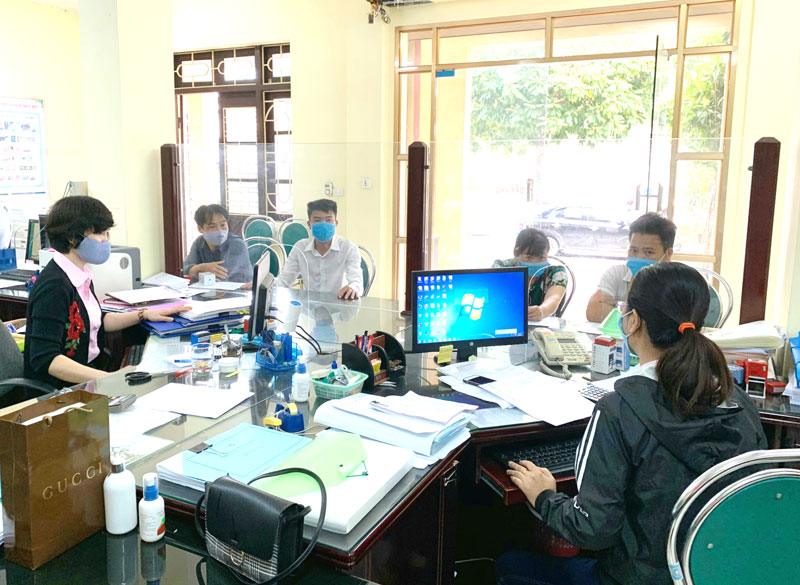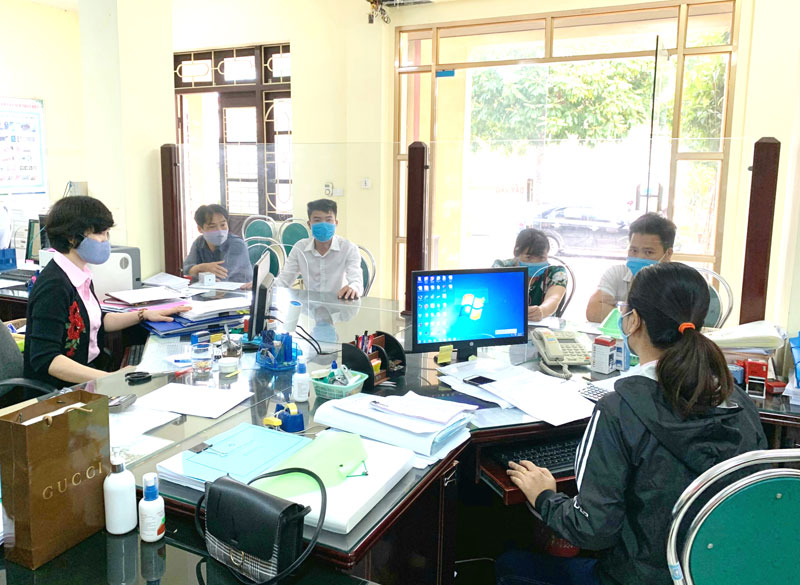
(HBO) - The COVID-19 pandemic recently has seriously affected disadvantaged people in Hoa Binh, especially the bank's customers who are poor and social policy beneficiaries.

Despite
complicated developments of the COVID-19 pandemic, the provincial branch of the
Social Policy Bank has timely disbursed capital to its customers.
Borrowers who have not repaid principaldebts, especially those that are
under medical treatment or quarantine due to COVID-19, will have their debt
payment deadline postponed.
The bank will also adjust the term of debts and provide new loans to help
customers restore their production and business, while focusing on handling
risky debts.
Amid the epidemic, thanks to its specific plans, the bank has promptly
disbursed credit to its customers, completing the planned target and ensuring
safety of its staff and customers.
In the first quarter, it disbursed 305.8 billion VND in loans to 9,139
customers.
By the end of March, total outstanding debt balance stood at over 3.17 trillion
VND, equivalent to 99.8 percent of the year plan, up over 50.4 billion VND, or
1.62 percent, compared to 2019.
Of which, the outstanding debt financed by local entrusted capital is 43.4
billion VND, increasing by 10.5 billion VND, and overfulfilling the year's plan
by 31 percent
The central Social Policy Bank has submitted a plan on reducing interest rates
for poor households and policy beneficiaries to the Prime Minister. If the plan
is approved, from April 1 to the end of 2020, the interest rates of loans to
poor households and loan programmes with interest rates equal to those for poor
households will be cut by 15 percent.
Meanwhile, the interest rates applied for those in other programmes will be cut
by 10 percent.
In the coming time, the provincial SocialPolicy Bank will be tasked with
providing loans to employers at a zero percent interest rate, to pay their
employees who had to stop working for three months.
The value of this support programme is expected to total 16.2 trillion VND,
benefiting about 3 million workers.
The provincial SocialPolicy Bank branch will closely follow the guidance
of the central SocialPolicy Bank to timely provide loans for customers,
towards helping customers overcome difficulties amid the pandemic./.
According to data from the Hoa Binh Provincial Party Committee, the industrial production index for the first six months of 2025 is estimated to have increased by 20% compared to the same period last year. This marks the highest year-on-year growth rate for this period since 2020.
In the first six months of 2025, Hoa Binh province’s export turnover was estimated at 1.145 billion USD, marking an 18.11% increase compared to the same period in 2024. Import turnover was estimated at $ 804 million, a 17.15% increase, which helped the province maintain a positive trade balance.
The lives of the ethnic minority farmers in Tan Lac district have gradually improved thanks to the new directions in agricultural production. This is a testament to the collective strength fostered through the professional associations and groups implemented by various levels of the district’s Farmers’ Union.
With the motto the "product quality comes first,” after nearly one year of establishment and operation, Muong village’s Clean Food Agricultural and Commercial Cooperative, located in Cau Hamlet, Hung Son Commune (Kim Boi district), has launched reputable, high-quality agricultural products to the market that are well-received by consumers. The products such as Muong village’s pork sausage, salt-cured chicken, and salt-cured pork hocks have gradually carved out a place in the market and they are on the path to obtaining the OCOP certification.
In the past, the phrase "bumper harvest, rock-bottom prices" was a familiar refrain for Vietnamese farmers engaged in fragmented, small-scale agriculture. But today, a new spirit is emerging across rural areas of Hoa Binh province - one of collaboration, organisation, and collective economic models that provide a stable foundation for production.
Maintaining growing area codes and packing facility codes in accordance with regulations is a mandatory requirement for agricultural products to be eligible for export. Recently, the Department of Agriculture and Environment of Hoa Binh province has intensified technical supervision of designated farming areas and packing facilities to safeguard the "green passport" that enables its products to access international markets.



